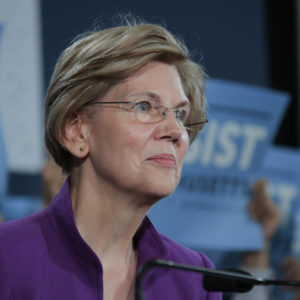After a year of attacking her opponents for taking donations from big-dollar “wine cellar’ donors and relying on support from Super PACS, Sen. Elizabeth Warren has reversed course. She now embracing a Super PAC taking millions from wealthy donors to boost her struggling campaign. The question now is: Will voters care?
A statement still up on Elizabeth Warren’s website reads “FACT: Elizabeth Warren doesn’t take any money from PACs or federal lobbyists, rejects Super PACs and won’t give donors special access.” On the campaign trail, she’s repeatedly insisted that ending the “corruption” of donations from business interests and the wealth is a necessary first step to acheiving her “big structural change” for America.
“Elizabeth rejects the help of Super PACs and would disavow any Super PAC formed to support her in the Democratic primary,” her website reads. “Democrats should show some moral backbone by refusing their own Super PACs in the 2020 primary.”
Just over a week ago, she sent an email to supporters bragging that “unlike everyone else in this race, she isn’t accepting any help from outside Super PACs”
But today she’s happily accepting the help of Persist PAC, a new pro-Warren super PAC that’s spending nearly $800,000 in TV and radio advertising so far in Nevada. According to Politico, this makes Warren the beneficiary of the biggest outside advertiser in the state before Saturday’s Democratic caucuses.
“If all the candidates want to get rid of super PACs, count me in. I’ll lead the charge,” Warren told reporters when asked about the Persist PAC spending. “But that’s how it has to be. It can’t be the case that a bunch of people keep them and only one or two don’t.”
Why the change? “She has no choice,” says Democratic strategist Robert Shrum, veteran of eight presidential campaigns and director of the Center for the Political Future at USC Dornsife. “I’m sure someone in the next debate will bring it up, but what else can she do? She needs the money.”
That’s even more true after her disappointing single-digit performance in the Nevada caucus on Saturday, the second contest in a row where Warren failed to get 10 percent support.
As a result, Warren’s campaign has been forced to use her fundraising success as a fundamental argument for remaining in the race. They’re touting the $5 million she raised immediately after the Las Vegas debate, her best-ever 24-hour fundraising haul. And speaking to supporters the night of the Nevada caucus, Warren played up the $9 million in total fundraising that week before turning her sights on the best-financed candidate in the field.
“I want to talk specifically for just a minute about a threat that is coming our way. And it’s a big threat. Not a tall one but a big one: Michael Bloomberg,” she said.
Billionaires like Bloomberg who give big to Super PACs have been at the center of Warren’s campaign for “ending the culture of corruption” and refusing money from “the wealthy and powerful.” Will Democratic primary voters punish her for abandoning the ethical high ground?
Supporters of campaign finance laws point to polls showing Americans support restrictions on campaign donations and spending, and even taxpayer-funded campaigns. GQR Research and End Citizens United released a poll purporting to show that 75 percent of independent voters said campaign finance reform and ending the culture of corruption was “very important.” And a 2018 Pew Poll found 77 percent of Americans supported limiting campaign spending.
What’s much harder to find is a candidate who actually lost an election for accepting the same contributions from large donors and PACs that, until recently, Warren was refusing. In fact, virtually all elected officials in high public office take these contributions or have taken then in the past.
“Remember, Barack Obama opted out of the entire public financing program in 2008 so he could blow out the spending caps, and it didn’t cost him politically,” notes pollster Spencer Kimball of Emerson College. And a 2015 poll from AP-NORC found Americans rejected the notion of taxpayer-funded elections by a 2-to-1 margin.
While the media love talking about campaign financing, there’s little evidence it’s an issue that actually moves votes.
“The problem with not taking PAC money is that your opponents are,” says Kimball. “Joe Biden started his PAC in November.”
“There actually are some people in the Democratic electorate who care about this issue,” Shrum says, “and Warren may pay a price with reform-minded activists. But once again–what else is she going to do?”

